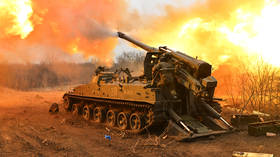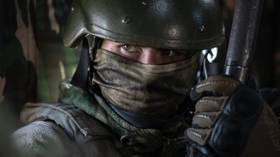‘Peace is unlikely in the near future’: Here’s what Russian experts think about Ukraine’s much-hyped counteroffensive

Conflicting information about the long-awaited and much-hyped counteroffensive of the Armed Forces of Ukraine (AFU) is coming from the front line. According to some reports, Kiev’s army has not met with much success on the battlefield.
Here, a group of leading analysts assess what we know about the current situation, approximately ten days since the operation began.
Sergey Khrapach, security expert, Reserve Russian Federal Security Service officer:
At the present moment, when the AFU still hasn’t inflicted its main blow, it is pointless to make presumptions. War is a rather exact science. If, as a result of strikes in multiple directions, the AFU manages to find weak spots in the Russian Army’s defense and delivers an attack that breaks through, then I see no visible prospects for resolving the conflict. Ukraine aims to liberate its territories within the 1991 state borders, but most likely, peace will only be possible after establishing the borders defined as of March 2022, or similar. Meanwhile, the considerable military potential of both sides makes it impossible to just freeze the conflict at this stage.
Oleg Ivanov, Head of the Center for the Settlement of Social Conflicts in Moscow:
Of course, it is still too early to say that the Ukrainian counteroffensive has fallen through. This is just the beginning – the AFU has large supplies of Western military equipment and it will take some time to destroy it. Moreover, I believe that at the NATO summit on June 15, the alliance will decide to increase military aid to Ukraine, possibly providing it with F-16 fighter jets, more tanks, and long-range missiles. So, in the near future, we should expect the AFU to intensify attempts to break through the front line. Otherwise, its chances of ‘pushing Russia back’ by autumn will be close to zero.
Grigory Sarbayev, founder of the legal firm Zakonoved:
The conflict will not be frozen. Economically speaking, the territory that was once Ukraine is like a drug addict that gets its drug – war – at the expense of new ‘doses’ of Western loans. It doesn’t have anything of its own. The supply of weapons will increase and the weapons will become more modern. For them, to stop means to die, because the West invests huge sums [in Ukraine]. In fact, the world [order] is being reconstructed [through this conflict].
Petr Bychkov, Candidate of Psychological Sciences and Associate Professor, Department of Political Psychology at the St. Petersburg State University:
The situation is difficult, the enemy is taking decisive action in several directions, not just on the front lines. The defense in the Zaporozhye direction was an unpleasant surprise for the AFU, but we should expect equally huge attacks in other directions. Ukraine is limited neither in human resources (having access to foreign mercenaries) nor funding. In my judgment, peace is unlikely in the near future.
Mikhail Neizhmakov, Director of Analytical Projects at the Agency of Political and Economic Communications:
Recently, both the press secretary of the president of the Russian Federation Dmitry Peskov and an adviser to the office of the president of Ukraine Mikhail Podoliak said that they see no basis for negotiations between Moscow and Kiev. Of course, global experience demonstrates that during the active phase of hostilities, the conflicting parties are less likely to talk about a rapid transition to dialogue and compromise – among other things, to avoid demotivating their troops. However, Western leaders may hope for active hostilities to continue at least until the official start of the presidential campaign in Russia [which is next year], so as to exert pressure on the Kremlin. For example, Joseph Biden's recent statements about having an “optimistic attitude” and supporting Ukraine “as long as it takes” indirectly indicate that the United States expects the conflict to continue.
Sergey Belokonev, Political expert, Director of the Institute of Global Studies of the Financial University under the Government of the Russian Federation:
It causes concern that the strategic initiative is in the hands of the enemy. Over the past several days, Ukraine has managed to push a few kilometers through our positions. Although it is currently engaged in defense, our army occupies a more advantageous position. But the liberation of this territory of the Russian Federation is an important task, both politically and legally speaking. I’m talking about the short term perspective. In the long term, if we leave a significant part of Ukraine occupied by NATO and Ukrainian Nazis, we will risk the renewal of hostilities at any moment.
***
This post was originally published in Russian on the ‘Nezygar’ telegram-channel













